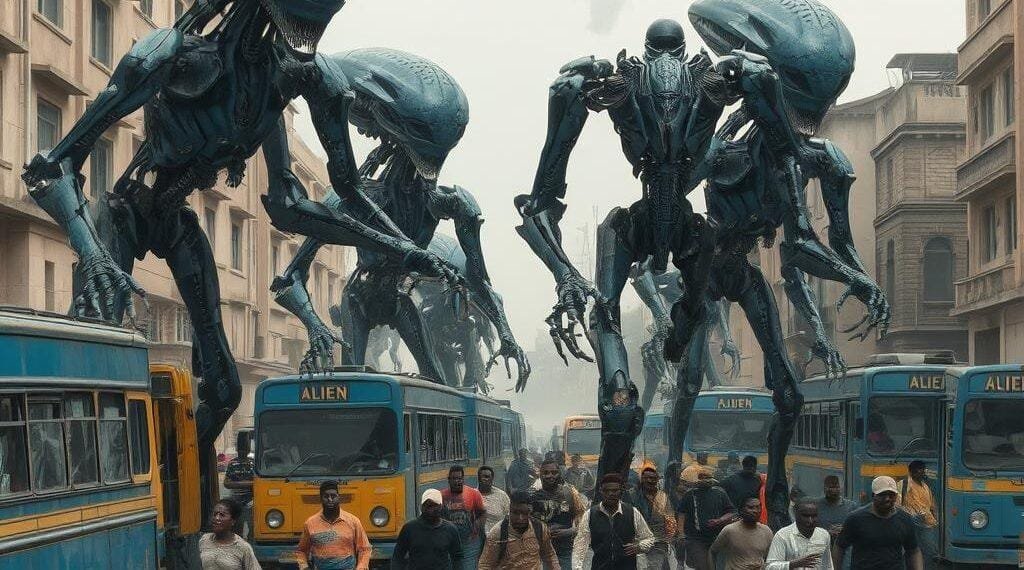When you think of science fiction, Hollywood’s massive productions come to mind—intergalactic battles, alien invasions, futuristic technology. But what if the next great sci-fi epic wasn’t set in New York or Los Angeles, but in the heart of Africa’s most vibrant city—Lagos? Enter Aliens in Lagos, a bold, groundbreaking film concept that is set to redefine African storytelling on the global stage.
This ambitious project is the brainchild of a visionary Nigerian storyteller, Adedeji Adeoba who first conceived the idea in 2014 while in his final year of university. “I was just creating different stories when this particular one came to me—Aliens in Lagos. It began to resonate deeply with me, the idea of science fiction in Africa, something we are not used to, but something I believed in from the onset,” he recalls.

However, bringing this dream to life has been a journey filled with challenges. The story, which first took shape in 2015, went through multiple rewrites as he struggled to articulate the depth of his imagination. “I wrote my first draft around 2016 or 2018, but when I read it, it just didn’t make sense. It wasn’t until 2021, after extensive research and even consulting AI, that I was able to fully develop the storyline.” Adedeji recounted.
Read Also: Gifting Nigerians smoke-free movies in new year and beyond
Unlike traditional African sci-fi, which often leans into mythological and historical narratives, Aliens in Lagos is set in a modern, bustling African city. The film aims to showcase Lagos as a thriving, contemporary metropolis while exploring how Africans would react to an alien invasion. “We’ve seen aliens invade New York, London, Tokyo… but what about Lagos? How would Nigerians respond to an extraterrestrial threat? How would the government react? These are the questions we’re answering in this story.”
The film doesn’t just focus on sci-fi; it embraces Nigeria’s rich cultural diversity. “Lagos is a melting pot. We have Yoruba, Igbo, Hausa, and different ethnic groups living together. That’s reflected in the characters, making the story deeply relatable to Africans while still appealing to a global audience.”
Visual effects (VFX) are crucial for bringing any sci-fi epic to life, but the cost of live-action production is staggering. This is why Aliens in Lagos is starting as an animated film. “Animation is more cost-effective while still allowing us to create the high-quality visuals needed to tell this story,” he explains. “But even that requires heavy investment. We’re talking about 3D animation with world-class VFX, and that doesn’t come cheap.”
Despite the financial challenge, investors are already taking notice. “We’ve received over 100 expressions of interest from people wanting to invest, and that’s just from our initial outreach. The long-term vision is to make Aliens in Lagos a franchise—something as big as Black Panther but with a stronger, more authentic African representation.”
The team behind Aliens in Lagos is not just thinking about a single film. Plans are underway to transform the project into a Public Limited Company, allowing investors to hold a stake in what could become a billion-dollar African sci-fi franchise. “We believe the best way to attract investors is to structure Aliens in Lagos as a public entity, ensuring transparency and long-term scalability. This is not just a movie—it’s a movement that will change how African stories are told globally.”
For decades, Hollywood has portrayed Africa through a narrow lens—often reducing it to war-torn villages, struggling economies, or ancient tribal settings. Aliens in Lagos seeks to shatter these stereotypes. “Every time an African appears in a Hollywood movie, they either can’t speak English properly or are portrayed as backward. That’s not our reality. Lagos is a tech hub, a business powerhouse, and a cultural giant. It’s time for the world to see that side of Africa.”
Adedeji cites Black Panther as a major inspiration but believes Aliens in Lagos will go even further in portraying modern African society. “While Black Panther celebrated African culture, it still placed Wakanda outside the real-world African experience. Aliens in Lagos is different—it’s grounded in an actual African city, with real cultural elements and a narrative that global audiences can connect with.”
With global streaming platforms like Netflix and Amazon Prime increasingly investing in African content, Aliens in Lagos is perfectly positioned to capitalize on this momentum. African cinema is on the rise, and sci-fi remains an untapped goldmine. This project isn’t just about telling a story; it’s about creating a global cinematic movement that puts Africa at the forefront of the sci-fi genre.
As the search for investors continues, one thing is certain: Aliens in Lagos is not just a film—it’s an opportunity to be part of history. Will you be among those who believed in it from the start?






